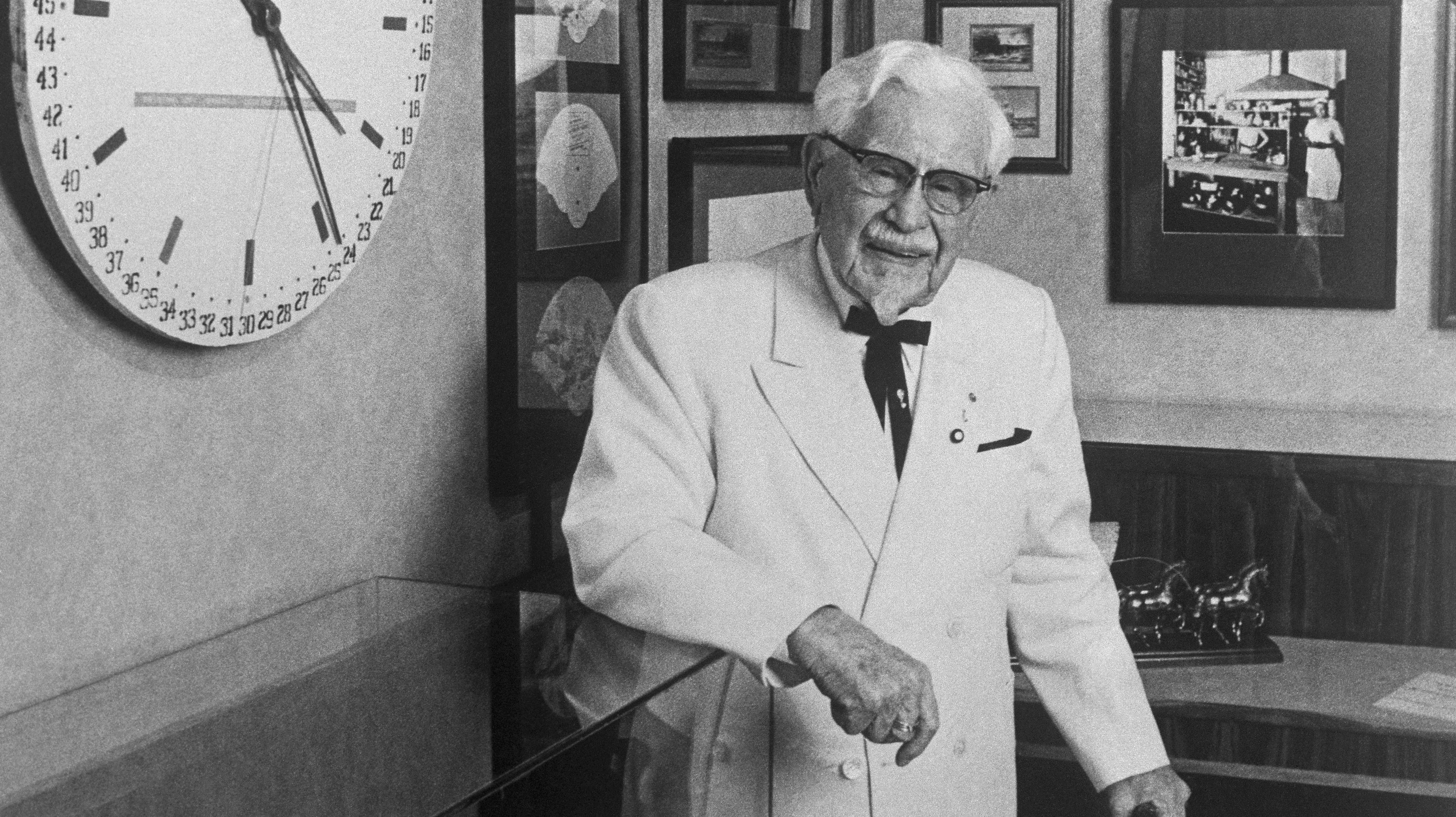The Spiciest Details They Better Not Leave Out Of Colonel Sanders' Biopic
A movie about KFC’s founder is in the works. Let’s hope it doesn’t skip the less-than-savory stuff.
Buckle up, because another fast food movie is in the works, and this time the subject is a man who still dominates commercials today: Colonel Harland Sanders. Deadline reports that the 1996 book written by Sanders' daughter Margaret, titled The Colonel's Secret: Eleven Herbs and a Spicy Daughter, is being adapted into a screenplay called A Finger Lickin' Good Story: The Life of Colonel Sanders.
Over the last decade or so, KFC has cashed in on Colonel Sanders' likeness, featuring him in ad campaigns as a jovial, chicken-loving old man, played by beloved celebrities like Norm Macdonald and Reba McEntire. And based on the source material and title of this new film, it seems that this biopic may similarly lean into painting the Colonel and his struggles to open a chicken restaurant in a sympathetic light. But before this movie comes to fruition, let us remind you that not everything about the man behind the fried chicken empire was "finger-lickin' good." Here are some details that shouldn't be left out of the movie.
Colonel Sanders once shot a man
Before opening Kentucky Fried Chicken, Colonel Sanders ran a Shell Oil gas station, and got involved in a pretty heated gas war with the owner of a neighboring Standard Oil gas station, the History Channel reveals. Sanders painted signs advertising his station on the sides of barns in the area, and when he heard the Standard Oil owner was painting over the Shell signs, he went to confront him. The confrontation turned into a shootout with one casualty: The rival gas owner shot and killed a Shell station manager and Sanders shot back in retaliation.
The KFC mogul was misogynistic
It sounds like Colonel Sanders was a capital-M Misogynist, not only because he allegedly constantly cheated on both his wives, but also because of the way he's on record talking about women. Franchise 500 notes that the KFC mogul was "notoriously licentious" and recounts a particularly upsetting quote from a 1970 New Yorker profile of Sanders in which he comments on a group of housewives asking for autographs: "Umm, that gal's let herself go... Look at the size of that one... I don't know when I've seen so many fat ones... Lord, look at 'em waddle."
We can only assume Sanders was very racist
Listen, Colonel Sanders was a white man who was born in the 1800s, so this isn't a stretch to ponder. But just in case you, like the fine people of Quora, are wondering just how racist he was, consider that according to Mic, Sanders was a major contributor to segregationist George Wallace's 1968 presidential campaign.
In 2018, "Papa" John Schnatter invoked Colonel Sanders' name to justify his use of the N-word, saying that the KFC mogul never faced public backlash for using the word. I think it's safe to say that if Colonel Sanders were alive today he would be promptly canceled.0
A Japanese baseball team carried the “Curse of the Colonel” for decades
The History Channel uncovered this gem: After Hanshin Tigers fans celebrated the team's championship win in 1985 by taking a statue of Sanders from a local KFC and tossing it into the river, a curse was believed to have fallen on the team—they haven't won a championship since. Sanders died in 1980, so this supposed hex would have been cast from the great beyond. The curse also appears not to be dictated by the fate of the statue, because that thing was pulled from its watery grave in 2009 and the team's luck still hasn't turned around.
Colonel Sanders hated KFC in the end
Turns out Colonel Sanders spent the last decade of his life hating on what KFC had become, quoted in that same New Yorker article from 1970 saying KFC's gravy "ain't fit for my dogs." And he ended up in several legal battles with the company after selling it in 1964, first suing the company in 1968 for $122 million when it tried to block his new restaurant venture, then being sued by KFC for libel in 1978 because of his frequent public comments about how much he hated KFC's new recipes.
Can't we agree that including at least some of these real details about the Colonel's life would make a more compelling biopic?
